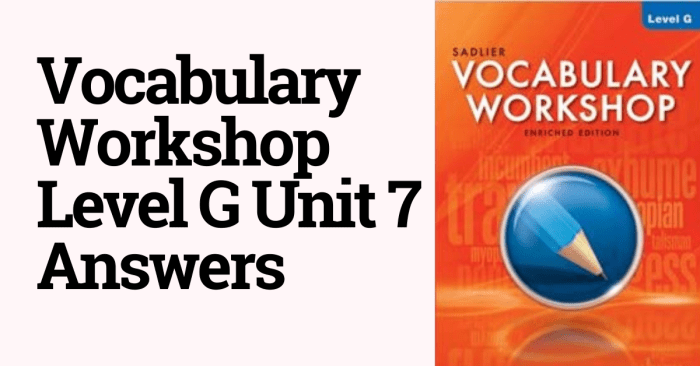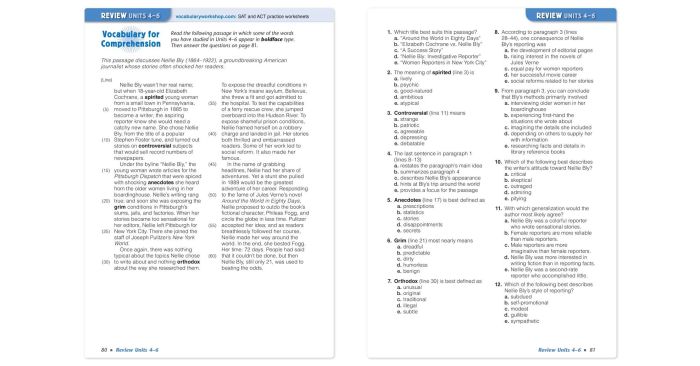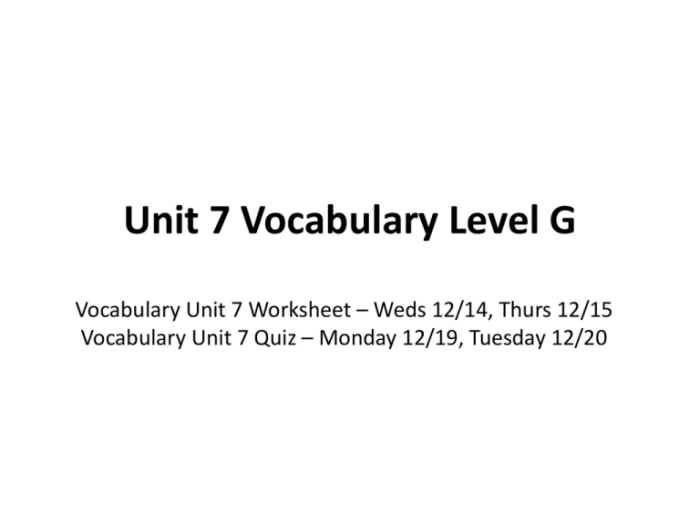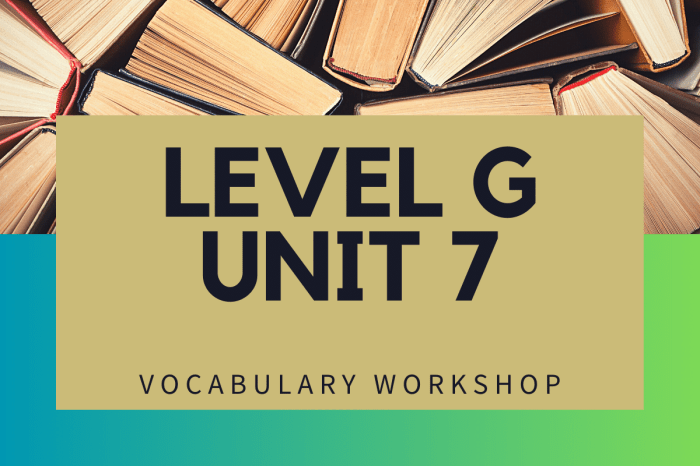Embark on a linguistic journey with Vocabulary Level G Unit 7, where we delve into the intricacies of vocabulary assessment, development strategies, and their implications for effective teaching practices. Brace yourself for an exploration that will elevate your vocabulary to new heights.
In this comprehensive guide, we unravel the methods and tools used to assess vocabulary level, empowering you with the knowledge to accurately gauge your students’ progress. We present a treasure trove of vocabulary development strategies, activities, and resources that will ignite your students’ passion for words.
Introduction
Vocabulary level refers to the depth and breadth of an individual’s knowledge of words. Assessing vocabulary level is crucial for several reasons. It helps identify areas where individuals may need support, track progress over time, and make informed decisions about language instruction.Unit
7 of the vocabulary level g curriculum focuses on developing students’ understanding of advanced vocabulary. Students will explore words related to various domains, including science, literature, and social studies. By expanding their vocabulary, students can enhance their communication skills, improve their comprehension of complex texts, and develop a deeper understanding of the world around them.
Importance of Vocabulary Development in Unit 7
In Unit 7, vocabulary development is essential for several reasons:
It enhances students’ ability to comprehend complex texts
Advanced vocabulary is often used in academic and professional settings. By expanding their vocabulary, students can better understand and engage with challenging materials.
It fosters critical thinking skills
Exploring the nuances of words and their meanings encourages students to think critically about language and the world around them.
It supports effective communication
A strong vocabulary allows students to express themselves more precisely and effectively, both verbally and in writing.
It promotes lifelong learning
Vocabulary development is an ongoing process that continues throughout life. By fostering a love of words and language in Unit 7, we can inspire students to become lifelong learners.
Vocabulary Level G Unit 7 expands your word power with terms like “magnanimous” and “ephemeral.” To reinforce these concepts, explore the mathematical concept of “n cubed increased by 5” at this link . This connection helps you grasp the vocabulary’s depth and applicability, solidifying your understanding of Vocabulary Level G Unit 7.
Assessment of Vocabulary Level
Assessing vocabulary level is crucial to determine an individual’s proficiency in using words. Various methods and tools are employed for this purpose, each with its own advantages and limitations.
Methods and Tools
Methods for assessing vocabulary level include direct and indirect measures. Direct measures involve testing individuals’ knowledge of specific words, such as through multiple-choice questions or word definitions. Indirect measures, on the other hand, assess vocabulary through reading comprehension or writing tasks, where individuals’ understanding of words is inferred from their ability to use them in context.
A range of tools can be used for vocabulary assessment, including standardized tests, vocabulary checklists, and running records. Standardized tests provide standardized measures of vocabulary knowledge and are often used for placement or diagnostic purposes. Vocabulary checklists allow educators to track students’ progress in acquiring new words.
Running records involve observing students’ reading and noting their ability to decode and comprehend words.
Types of Vocabulary Assessments
There are several types of vocabulary assessments, each designed to measure different aspects of vocabulary knowledge. These include:
- Recognition assessments:These assess individuals’ ability to recognize and identify words.
- Production assessments:These assess individuals’ ability to use words in speaking or writing.
- Comprehension assessments:These assess individuals’ ability to understand the meaning of words in context.
Specific Examples for Unit 7
For Unit 7, the following vocabulary assessments could be used:
- Recognition assessment:A multiple-choice quiz on the vocabulary words introduced in the unit.
- Production assessment:A writing assignment where students are asked to use the vocabulary words in a short story or essay.
- Comprehension assessment:A reading passage with vocabulary words embedded in the text, followed by comprehension questions.
Vocabulary Development Strategies

Expanding vocabulary is a continuous process that requires consistent effort and engagement. Effective strategies can help individuals acquire new words and enhance their understanding of language. This section explores various vocabulary development strategies and provides examples that can be applied in Unit 7.
Reading, writing, and speaking play vital roles in vocabulary development. Reading exposes individuals to diverse language structures and new words. Writing allows them to practice using these words in context, while speaking provides opportunities to actively engage with language and reinforce new vocabulary.
Incorporating Vocabulary Development Activities, Vocabulary level g unit 7
Unit 7 offers ample opportunities for vocabulary development. Here are some specific activities that can be implemented:
- Contextual Analysis:Encourage students to analyze words within their context in texts. They can identify unfamiliar words, infer meanings from surrounding sentences, and use context clues to enhance comprehension.
- Word Mapping:Create visual representations of words and their meanings. Students can use mind maps, concept maps, or diagrams to connect new words to known concepts and expand their understanding.
- Vocabulary Journals:Provide students with journals to record new words they encounter. They can write down definitions, synonyms, antonyms, and examples of usage to reinforce their understanding.
- Word Games:Incorporate word games like crosswords, Scrabble, or word searches to make vocabulary learning engaging and enjoyable. These activities encourage active recall and reinforce new words.
- Collaborative Learning:Facilitate group discussions and peer-to-peer interactions where students can share their understanding of new words, engage in vocabulary-building exercises, and provide feedback to each other.
Examples of Vocabulary Level in Unit 7

In Unit 7, students will be introduced to various vocabulary words related to different themes and categories. These words are essential for comprehending texts and expressing ideas effectively in the target language.
The vocabulary words in Unit 7 are organized into the following categories:
Places and Buildings
- Library: A place where books and other materials are kept for reading, study, or reference.
- Museum: A building where objects of historical, scientific, or artistic interest are kept and displayed.
- Hospital: A building where sick or injured people are treated by medical professionals.
Transportation
- Bus: A large vehicle that carries passengers along a fixed route.
- Train: A series of connected carriages that run on rails, used for transporting passengers or goods.
- Plane: A fixed-wing aircraft that is powered by one or more engines and is used for flying.
People and Occupations
- Doctor: A person who is qualified to treat and diagnose illnesses and injuries.
- Teacher: A person who teaches at a school or other educational institution.
- Engineer: A person who designs, builds, or maintains engines, machines, or structures.
Implications for Teaching

Vocabulary level assessment has significant implications for teaching practices. By understanding students’ vocabulary levels, teachers can tailor their instruction to meet their individual needs.
Assessment results can inform teachers about:
- Students’ strengths and weaknesses in vocabulary
- Areas where students need additional support
- The effectiveness of current teaching strategies
Differentiating Instruction
Based on vocabulary level assessment, teachers can differentiate instruction to ensure that all students are challenged and supported. This may involve:
- Providing targeted vocabulary instruction to students who are struggling
- Offering enrichment activities for students who are ahead
- Using different materials and resources to meet the needs of different learners
- Creating a supportive and inclusive learning environment where all students feel comfortable taking risks and learning new words
Conclusion: Vocabulary Level G Unit 7

In summary, assessing and developing vocabulary level is crucial for students’ overall language proficiency. This article has emphasized the importance of vocabulary level assessment in identifying students’ strengths and weaknesses, and the significance of vocabulary development strategies in expanding their lexical knowledge.
To enhance vocabulary level, teachers can employ various strategies such as explicit instruction, vocabulary notebooks, and exposure to rich and diverse language. These strategies can be tailored to different learning styles and levels, ensuring that students acquire and retain new words effectively.
Suggestions for Further Research
Further research can explore the impact of different vocabulary development strategies on students’ vocabulary growth, particularly in specific subject areas or language contexts. Additionally, investigating the role of technology and digital tools in vocabulary acquisition can provide valuable insights for educators.
Top FAQs
What is the significance of assessing vocabulary level?
Assessing vocabulary level provides valuable insights into students’ language proficiency, reading comprehension, and overall academic performance. It helps teachers identify areas for improvement and tailor instruction to meet individual needs.
How can I effectively develop my students’ vocabulary?
Incorporate diverse vocabulary development activities such as reading aloud, vocabulary games, word walls, and interactive discussions. Encourage students to engage with new words through writing, speaking, and listening activities.